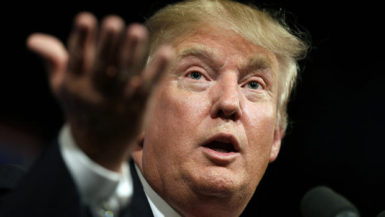By Alicia Nicholls
Reprinted from Caribbean Trade Law and Development: Posted on November 17, 2016
The United States’ position as most Caribbean countries’ largest economic partner and an important foreign policy ally means that constructive engagement with the incoming Trump administration is not just a choice but an imperative. The Caribbean Community (CARICOM) and individual Caribbean governments have all expressed congratulatory messages, emphasizing their willingness to work with Mr. Trump and continuing the harmonious US-Caribbean relationship.
But in contrast to the idealism attending then Senator Barack Obama’s “Yes we can” message eight years ago, a spectre of profound uncertainty shrouds the President-elect not just because of his extreme rhetoric on trade and foreign policy, undergirded by his “Make America Great Again” and “America First” refrains, but also the lack of policy specificity.

In this article, I will outline what I believe are five key priorities which will likely frame US-Caribbean economic and foreign policy engagement for the foreseeable future:
Correspondent Banking/De-Risking
A first order of business will be continuing the conversation that CARICOM governments and stakeholders have started with US officials and regulators on the de-risking activities of US-based international banks, including the withdrawal and restriction of correspondent banking relationships. These relationships are Caribbean’ lifeline to the global financial and trading system, critical for the trade, investment and remittance flows which buoy our small open economies and sustain households.
US foreign policy orientation towards the Caribbean has constantly recognized that an economically secure “third border” complements US’ strategic security interests. Any threat therefore to the region’s economic and financial inclusion is something which should be of mutual concern. Unfortunately, there appears to be limited progress on the correspondent banking issue.

While de-risking is a cost-benefit decision for banks, it is also partly fuelled no doubt by ambiguous regulations and the Caribbean’s undeserved reputation in some quarters as a high risk place for doing business. To their credit, the US Treasury and Federal Banking Agencies released a Joint Factsheet on Foreign Correspondent Banking. Additionally, the US Treasury has reiterated that the de-risking issue is a “key priority”.
However, actions by US authorities which unfairly label Caribbean countries as “tax havens” contribute to the perception that Caribbean jurisdictions and banks are higher risk. In 2015 the state legislature of Montana, and the District of Columbia, had included several Caribbean countries among their proposed lists of tax havens. This is despite Caribbean countries’ having taken steps to ensure their compliance with the Foreign Account Tax Compliance Act (FATCA) and our clean bill of health by the Organisation for Economic Cooperation and Development (OECD).Continued engagement with US states and federal authorities on this issue is a must.
International Financial Services & FATCA

Although President-elect Trump has promised to lower the US federal corporation tax rate from 35% to 15% and provide a deemed repatriation of corporate profits held offshore at a one-time tax rate of 10%, his orientation towards international financial centres (IFCs) in general is not well-known.
The Obama administration has not been friendly to Caribbean IFCs, and that is putting it mildly. On the other hand, Mr. Trump’s background as a businessman may make him more appreciative of the role IFCs play in making US businesses more efficient and profitable, which in turn facilitates their contribution to US economic and job growth. Moreover, conventional wisdom holds that Republican governments are usually friendlier to the Caribbean than are Democratic governments, and there is good anecdotal evidence to support this.
Additionally, continued engagement with US authorities will be necessary to iron out any implementation and reporting issues under FATCA.
Caribbean Basin Initiative & Other Market Access Issues
Manufacturers in most Caribbean countries enjoy non-reciprocal duty-free access to the US market for most goods under the Caribbean Basin Initiative (CBI), an initiative of the Reagan administration in the 1980s which had both economic, ideological and geopolitical imperatives. The CBI is unilateral which means that the benefits can be unilaterally revoked and the criteria for eligibility changed at any time. However, CBI is generally believed to be beneficial to US manufacturing and jobs and Caribbean has a large trade deficit with the US, which should keep CBI off the President-elect’s immediate radar.
One sticking point in US-Caribbean trade relations is the cover over subsidies which the US Federal government pays to the US territories of Puerto Rico and the US Virgin Islands out of excise taxes it collects from imported rums, which has made Caribbean rums less competitive in the US market. Turning to merchandise trade in general, non-tariff barriers such as sanitary and phyto-sanitary and labelling requirements have also been a constraint on market access.
Caribbean workers benefit from temporary employment under the US Farm Workers and Hospitality Workers programmes. However, outside of this, Caribbean service providers have no preferential access to the US market. The CBI does not cover services trade. Caribbean business persons seeking to supply a service in the US instead rely on non-immigrant visas. Mr. Trump has promised to tighten the US’ border and control policy. It is not certain whether this will be extended to non-immigrant visas as well.
Immigration & Workers’ Programmes
Mr. Trump made tightening immigration one of the cornerstones of his campaign platform. While his ire was directed towards Mexican and Muslim immigrants, Caribbean immigrants will be collateral damage. For instance, undocumented immigrants who had come to the US as children and had identified themselves in good faith when applying for protection under the Deferred Action for Childhood Arrivals (DACA) programme might have unwittingly made themselves prime targets for deportation if Mr. Trump goes through with his plans.
Most Caribbean immigrants are law-abiding citizens who are making sterling contributions to the American society. However, another pertinent concern is Mr. Trump’s vow to accelerate the deportation of those immigrants convicted of crimes to their country of birth, which has been a sticking point in US-Caribbean relations for some time. Caribbean governments have criticised the deportation of persons who were born in the Caribbean but socialised in the US with only superficial Caribbean roots. They have also linked these deportations to increased violent crime in the Region.
Mr. Trump has also spoken earlier about reforming legal immigration. This will make it difficult for Caribbean persons to emigrate legally to the US. This also has implications for remittances, a lifeline for many poorer Caribbean households.
- Mobilising Climate Finance
Climate finance is needed to assist countries, particularly poorer and most vulnerable countries, in their climate change adaptation and mitigation efforts. It is something which the Small Island Developing States in particular were adamant upon during the negotiations leading up to the eventual signing of the Paris Climate Change Agreement. Developed countries committed themselves to mobilising 100 billion USD in climate finance from a variety of sources each year by 2020, a pledge which dates back to Copenhagen in 2009 and one which President Obama has supported. Caribbean countries have also received climate change aid under USAID programmes.
Mr. Trump, however, is not a believer in anthropogenic (man-made) climate change, and has vowed to “cancel the Paris Agreement”, to ramp up fossil fuel production and to defund the clean energy initiatives. Further US contribution to the Green Climate Fund, which was established to assist developing countries like those in the Caribbean, is now in question.
Conclusion
Mr. Trump’s election has evoked an aura of uncertainty over what will be the future paradigm of US-Caribbean relations. Although the Caribbean had not featured in the policy discussions during the campaign, Mr. Trump’s populist rhetoric illustrated a marked departure from the tenets of current US economic and foreign policy. He has, however, been light on specifics. If implemented, his proposals will be a strong departure from current US policy, particularly in the area of climate change which I addressed in a previous post.
Nonetheless there are two sparks of hope. Firstly, President-elect Trump is a businessman at heart and should be more attuned to a ‘dollars and cents’ argument. Secondly, Mr. Trump’s malleability in regards to his positions evinces some pragmatism on his part. It is worth remembering that for much of his public life, Mr. Trump has espoused liberal views until becoming an independent and then a Republican in later years. He has also softened some of his most ardent positions during the campaign and since winning the election, and has also been rumored to be considering some of his former Republican opponents for Cabinet positions.
These two factors suggest that there may be more scope for discussion with a Trump administration than may initially be perceived. What will the emerging Trump Doctrine mean for the Caribbean? And whether we will see a “hard” or “soft” Trump, to borrow the clever nomenclature employed by former WTO Director General, Pascal Lamy, no one knows. A clearer sense of Mr. Trump’s true policy orientation will be more discernible when more of his Cabinet picks are revealed and his proposals are elaborated upon.
While these issues I have highlighted will not be policy priorities for the Trump Administration, they are issues of importance to Caribbean countries. As such, Caribbean governments and other stakeholders must be pro-active in their engagement with the Trump administration from day-one when he assumes office in January 2017.
Alicia Nicholls is a trade and development consultant with a keen interest in sustainable development, international law and trade. You can also read more of her commentaries and follow her on Twitter @LicyLaw.





